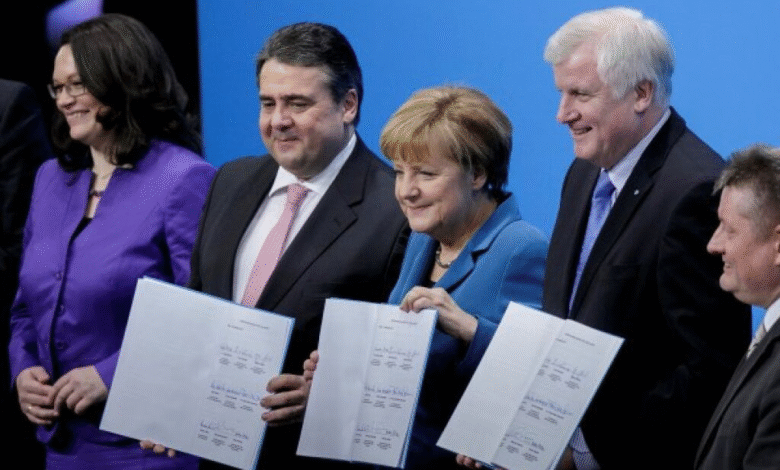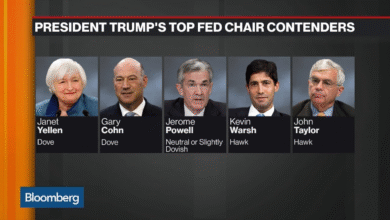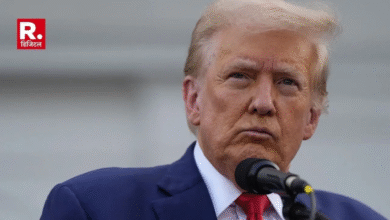Germany’s New Government: A Call to Action for Business Leaders

Germany’s new government has stirred significant interest among the nation’s business leaders and economists as they gather to discuss vital economic reforms. With Chancellor Friedrich Merz at the helm, there are soaring expectations for a revitalized German economy following a challenging period of stagnation. The recently held government summit underscored the urgency for the administration to fulfill campaign promises and capitalize on positive market sentiment. Business leaders are keenly aware that any misstep could derail advancements and have expressed that a ‘lazy summer’ is simply not an option for the new government. As the country looks toward a phase of renewed growth, the focus remains firmly on innovation, investment, and the economic strategies that will shape Germany’s future.
In the wake of recent political transitions, the newly appointed administration in Germany faces critical scrutiny from influential business sectors. This emerging coalition, led by Chancellor Friedrich Merz, represents a potential turning point for the country’s economic landscape, which has suffered from prolonged sluggishness. As corporate leaders rally for immediate action and the implementation of strategic reforms, there is a palpable sense of hope for the prospects ahead. Stakeholders emphasize the necessity for swift execution of policies that can stimulate growth and address economic concerns. This pivotal moment serves as a call to action for the new leadership to transform ambitious declarations into tangible results for the German economy.
Germany’s New Government: A Call to Action
The recent summit held near Tegernsee highlighted a unified message from Germany’s business leaders to the new government: immediate action is imperative. With the German economy showing signs of recovery, the optimism surrounding Chancellor Friedrich Merz’s leadership is palpable. Business executives stress that any missteps or delays could threaten the fragile progress achieved in recent months, as they see a key opportunity to enact necessary economic reforms.
Economists and industry leaders believe that the new government’s approach should focus on revitalizing the economy by implementing bold fiscal policies and reducing bureaucratic hurdles. As the German DAX index navigates record highs, the demand for prompt action symbolizes a collective hope for a turnaround. The summit attendees emphasized that the momentum built during the market’s recovery must not be squandered; instead, it should be the springboard for the reforms promised during the electoral campaign.
Economic Reforms and Their Impact on Business Leaders in Germany
Chancellor Friedrich Merz’s newly formed government has a unique opportunity to pursue economic reforms that can significantly bolster Germany’s business landscape. High-profile business leaders are clamoring for a strong policy framework that aligns with innovative strategies and encourages investment, especially in sectors critical to Germany’s competitive edge. With Germany’s economy having been stagnant for over two years, the anticipation of sweeping reforms is both a cause for hope and concern.
During the summit, representatives from diverse industries articulated a clear vision for a future powered by less bureaucracy and more emphasis on innovation. Leaders in the automotive sector and beyond voiced their urgency for change, recognizing that the country cannot remain complacent. By addressing the existing challenges head-on and streamlining regulations, Germany’s new government can foster an environment that enables businesses to thrive, thus enhancing the overall economic landscape.
The Role of Business Leaders in Shaping Policy in Germany
Business leaders in Germany are increasingly vocal about their expectations from the new government, reinforcing the notion that public-private collaboration is essential for economic recovery. With the new government promising progress on economic reforms, these leaders view their involvement as crucial in guiding the direction of policies that affect their industries. The input from business executives at forums and summits showcases the willingness to partner with the state to stimulate growth.
The synergy between the government and the business community could lead to transformative changes within the German economy. Leaders such as Gernot Döllner from Audi emphasize the importance of tangible government actions that complement the ongoing discussions about policy reform. With pressures like competition from international markets and technological advancements at play, the insights from business sectors will play a pivotal role in shaping a resilient economic strategy moving forward.
Germany’s Economic Outlook Amidst Political Change
As political turmoil from previous administrations fades, Germany’s new government must focus on leveraging the current positive market conditions to implement vital economic reforms. Leaders like Katherina Reiche, the new economy minister, underscore the need for strategic planning and decisive action to address years of stagnation. The optimism present at the recent summit reflects a broader sentiment that the new government possesses the mandate to revitalize growth.
However, this optimism must be matched with accountability and results. With the German economy seen as robust yet burdened by past challenges, the onus falls on the new government to fulfill its promises. Business leaders are hopeful that swift action will lead to a sustainable turnaround, thus connecting the dots between high hopes and concrete economic advancement.
Addressing Bureaucracy: A Priority for the New Government
One of the central themes emerging from the summit was the need to tackle bureaucratic obstacles that inhibit business growth in Germany. Leaders from various sectors championed simplification of processes, arguing that reducing red tape is key to positioning the country favorably against other competitive economies. A streamlined bureaucracy would not only encourage domestic investment but also attract foreign entities looking to establish operations in Germany.
The consensus among business leaders is clear: the success of Germany’s new government will greatly hinge on its ability to enact reforms that minimize bureaucratic interference. This focus on efficiency aligns closely with the expectations set forth during the electoral campaign, and failure to deliver on these promises could stifle the optimistic sentiments currently surrounding the market.
The Business Community’s Expectations from Chancellor Friedrich Merz
Chancellor Friedrich Merz’s ascent to leadership comes with high expectations from Germany’s business community. From the summit discussions, it was evident that industry leaders are looking for a proactive government that not only listens to their concerns but also champions policies that stimulate economic growth. This mutual collaboration is expected to pave the way for a resilient economic framework.
Furthermore, the bold vision articulated by Merz, focusing on innovation and competitiveness, resonates well with what business leaders seek. They anticipate a government that acts decisively in the face of challenges posed by both domestic and international markets, signaling a new era of engagement between the state and the business sector.
Investment in Innovation: A Crucial Component for Economic Revival
At the recent summit, leaders highlighted the crucial role that innovation plays in Germany’s economic revival. The call for increased investment in technology and research resonates strongly with business executives, many of whom see this as foundational not just for staying relevant in a global market, but also for enhancing productivity across all sectors. Chancellor Friedrich Merz’s government has the opportunity to position itself as a proponent of transformative innovation.
By prioritizing research and development, the new government can contribute to building a robust infrastructure that attracts skilled talent and fosters entrepreneurial initiatives. The business community is counting on the government to create a conducive environment that will allow innovative ideas to flourish and drive sustainable growth in the German economy.
The Auto Industry’s Role in Germany’s Economic Future
The automotive sector’s significance to Germany’s economy was underscored by representatives at the summit, who stressed the urgent need for policies that support this critical industry. As the country faces fierce competition from global markets, especially with the transition towards electric mobility, Chancellor Friedrich Merz’s administration is expected to address both the challenges and opportunities present in this sector.
Leaders from the automotive industry expressed optimism that strategic government initiatives could help streamline production processes and facilitate the transition to electric vehicles. This commitment is vital not only for maintaining competitive advantage but also for reducing dependency on fossil fuels, positioning Germany as a leader in sustainable automotive innovation.
The Urgent Need for Economic Turnaround in Germany
Participants in the Tegernsee summit conveyed a pressing need for an economic turnaround in Germany, highlighting the importance of immediate action from the newly formed government. The previous government’s inability to deliver growth has left a vacuum that business leaders hope the Merz administration will fill. The urgency of implementing practical solutions to overcome stagnation cannot be overstated.
As economic experts note, the steps taken by the new government will be closely scrutinized over the coming months. Establishing a clear roadmap for fiscal responsibility and growth-oriented policies is essential for restoring confidence among investors and the public. The collaboration between business leaders and government needs to foster an environment where innovative solutions can thrive, ensuring Germany’s economic prosperity.
Frequently Asked Questions
What are the expectations for Germany’s new government under Chancellor Friedrich Merz?
Germany’s new government, led by Chancellor Friedrich Merz, is expected to fulfil campaign promises and address the pressing economic concerns facing the nation. Business leaders have called for swift action, emphasizing the need for economic reforms and a turnaround after years of stagnation in the German economy.
How are business leaders in Germany reacting to the new government’s approach to economic reforms?
Business leaders in Germany are cautiously optimistic about the new government’s approach to economic reforms. At a recent summit, they urged the administration to avoid complacency and to implement policies that promote growth, reduce bureaucracy, and stimulate investment in the German economy.
What challenges does the new German government face in revitalizing the economy?
The new German government must tackle several challenges to revitalize the economy, including addressing stagnation over the past two years, implementing comprehensive economic reforms, and navigating tensions from past political turmoil. Business leaders warn that any missteps could hinder trust and progress towards a more robust economic environment.
What initiatives have been proposed by Germany’s new government to boost the economy?
Germany’s new government has proposed initiatives aimed at boosting the economy, including the introduction of a major fiscal package, reducing bureaucracy, and promoting innovation. These goals are part of the coalition agreement and are crucial for reviving the German economy and instilling confidence among business leaders.
How is the German economy performing since the new government took office?
Since the new government took office, the German economy has shown signs of optimism, highlighted by a surge in the DAX index. However, challenges such as stagnation and the need for substantive economic policies remain, pressing the new administration to deliver tangible results swiftly.
What has been discussed at the recent government summit regarding the German economy?
At the recent government summit, discussions focused on Germany’s economic outlook, the need for immediate action from the new government, and expectations from business leaders for significant reforms. The overarching message was clear: the new administration must avoid a ‘lazy summer’ and instead push for profound changes to address the economy’s stagnation.
What are the key priorities for Chancellor Friedrich Merz’s government in terms of economic policy?
Chancellor Friedrich Merz’s government is prioritizing economic policies that focus on reducing bureaucracy, stimulating investment, fostering innovation, and ensuring swift implementation of the coalition’s economic reforms. These priorities aim to steer Germany towards recovery and sustained growth.
How does the sentiment of business leaders influence Germany’s new government’s strategies?
The sentiment of business leaders significantly influences Germany’s new government’s strategies, as these leaders are advocating for immediate and effective actions. Their call for accountability and swift implementation of reforms shapes the government’s approach to addressing economic challenges and boosting overall confidence in the German market.
What implications do the calls for swift actions from business leaders have for Germany’s political landscape?
The calls for swift action from business leaders imply that the new government must maintain a proactive stance to retain support and credibility among stakeholders. Failing to deliver on promises may lead to increased scrutiny and pressure on the administration, impacting the political landscape and future governance in Germany.
| Key Points |
|---|
| Business leaders urge the new government to fulfill campaign promises. |
| Any missteps in the early days of the administration are unacceptable. |
| The summit indicated a strong optimism about the potential changes under Chancellor Friedrich Merz. |
| Germany’s economy, despite high DAX index, is struggling with stagnation and needs revitalization. |
| Urgent reforms and fiscal packages are expected to be delivered promptly by the new government. |
| There is significant pressure for quick action to combat bureaucracy and enhance investment. |
Summary
Germany’s new government faces significant expectations as it embarks on its journey to rejuvenate the nation’s economy and fulfill the promises made during the election campaign. The business community is keenly watching, urging swift action to avoid a stagnant summer. With the recent positive sentiment and support from industry leaders, the administration led by Chancellor Friedrich Merz has the opportunity to not only restore confidence but also drive Germany towards renewed economic vigor. Immediate reforms and a commitment to reducing bureaucracy are paramount to meet these high hopes.




